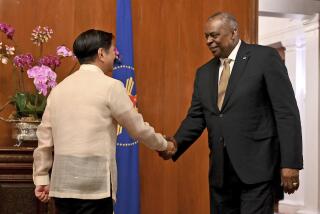Reagan Reasserts His Support for Aquino as Crisis Ebbs
- Share via
President Reagan offered renewed support Saturday for Corazon Aquino, the embattled president of the Philippines, and the White House said that Reagan is “gratified and relieved” that the Aquino government had resolved the crisis of an attempted coup.
“The President wishes to express his wholehearted support, and that of his Administration, the Congress and the American people for President Aquino and the democratic principles she represents,” White House spokesman Marlin Fitzwater said in a written statement.
The statement was issued at the end of Reagan’s four-day visit to Los Angeles.
Immediately after delivering his weekly radio address to the nation, the President flew by helicopter to his ranch, northwest of Santa Barbara, to complete a 25-day California vacation.
Reagan’s show of support for Aquino was the third such demonstration in three days, as the Aquino government turned back the most severe threat against it since it took office in February, 1986.
In his statement, Fitzwater said “the President was deeply distressed by the injury suffered by President Aquino’s son (Benigno S. Aquino III) and the deaths and injuries of the numerous victims--both military and civilian--of these unfortunate events.”
He said Reagan is “determined to continue working closely with President Aquino on behalf of her efforts to strengthen democracy in the Philippines.”
The President used his radio address to present a five-minute review of U.S.-Soviet relations, offering a summary notable primarily for its low-key tone.
As he has many times before, Reagan criticized what he called “Soviet adventurism” in Afghanistan, Cambodia, Angola and Nicaragua, and “a massive Soviet military buildup throughout the 1970s,” which, he said, was “met with inaction in the United States.” But he continued, “Today much has changed. We have built up our military, and the Soviets have responded to our new strength with a new willingness to talk seriously about arms reductions.
“Today we are close to an agreement with the Soviets” to eliminate the intermediate-range nuclear weapons in the U.S. and Soviet arsenals, he said.
His remarks echoed comments he made Wednesday in a speech here on U.S.-Soviet relations in general.
More to Read
Get the L.A. Times Politics newsletter
Deeply reported insights into legislation, politics and policy from Sacramento, Washington and beyond. In your inbox twice per week.
You may occasionally receive promotional content from the Los Angeles Times.










